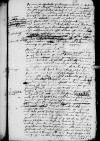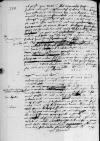Letter #1733
[Ioannes DANTISCUS] to [Seweryn BONER]Löbau (Lubawa), 1537-09-28
English register: Dantiscus is replying to two letters from Boner. He thanks him for the news and for sending the gold cup – a gift from Count Otto Heinrich (Wittelsbach), and also for the greetings and news from Mikołaj Nipszyc. Dantiscus informs Boner about the Danish king’s coronation. He notes that the ceremony, which was held in Copenhagen, lacked the element of anointment. Albrecht, prince in Prussia, returned to Gdańsk from the coronation eight days ago. Because of the pestilence, he was forced to travel by sea. Knowing the customs and nature of the Danes, Dantiscus does not believe in Denmark’s lasting friendly feelings towards Prussia, or lasting peace in this region in general. Dantiscus informs Boner that the Warmia Chapter has elected him bishop. Boner will receive detailed information from Mikołaj Nipszyc once he returns from the Prussian assembly. Dantiscus assures Boner of his gratitude for his services.
Manuscript sources:
Auxiliary sources:
Prints:
| ||||||||||||||||||
Text & apparatus & commentary Plain text Text & commentary Text & apparatus
Magnifice Domine, Amice carissime et honorande. Salutem et omnis felicitatis Magnificentiae Vestrae precor accessum.
Accepi iis diebus a Magnificentia Vestra binas et uberes summae in me benevolentiae cf.
Aderat ad eum cohonestandi actum cum quibusdam aliis ducibus et nuntiis
Ex
[1 ] Otto Heinrich Wittelsbach was commanded by King Sigismund I, Dantiscus conducted negotiations with him in Cracow during the Diet of 1536/37
[2 ] Commanded by God, the biblical prophet Samuel anointed first Saul and then David as kings, so Dantiscus is using the name Samuel as the symbol of a person endowing royal power with a sacral character. (cf. KOPALIŃSKI 1990 p. 1033; Vulg. 1Sm 8.22 dixit autem Dominus ad Samuhel audi vocem eorum et constitue super eos regem ⌊Kopaliński, p. 1033cf. KOPALIŃSKI 1990 p. 1033; Vulg. 1Sm 8.22 dixit autem Dominus ad Samuhel audi vocem eorum et constitue super eos regem ⌋

